(2) Partnerships Inviting Civil Participation from NGOs and Others
A. Japanese Overseas Cooperation Volunteer Program
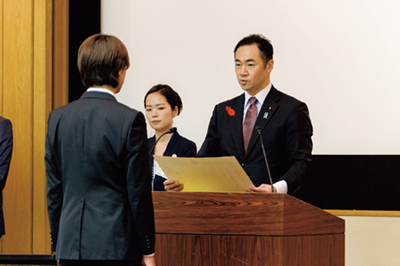
State Minister for Foreign Affairs SUZUKI Keisuke presenting a certificate of appreciation to a returned volunteer at the Ceremony of Foreign Minister’s Certificate of Appreciation and Gathering (October 2019)
The JICA volunteer program, which includes Japan Overseas Cooperation Volunteers (JOCVs), was founded in 1965 and has been delivering results for more than half a century. The Program has dispatched over 50,000 volunteers to 92 countries in total, contributing to the development of developing countries as a precise example of the “visibility of Japanese Development Cooperation.” This Program is a public participatory program, under which volunteers take 70 days of training prior to their dispatches, and are then assigned to developing countries in principle for a two-year-term to assist economic and social development in the countries, while living and working with the local communities (see also “Stories from the Field” and the column).
The JOCV program is highly recognized both domestically and internationally. The program not only contributes to the economic and social development of the recipient countries, but also to deepening local people’s affinity for Japan, thereby promoting mutual understanding and friendship between Japan and these countries. Moreover, the program is drawing attention in the respect that the volunteers return their experiences to society. For example, returned volunteers, who gain global perspectives throughout the program, contribute to the regional revitalization in Japan and the business expansion of Japanese private companies in developing countries (see the glossary for details on the “Japan Overseas Cooperation Volunteer (Private Sector Partnership)”).
In order to promote these initiatives, the Government of Japan has been striving to make it easier for more people to participate in this Program through supporting returned volunteers in developing their careers, as well as disseminating information on how to participate in the Program as incumbents through taking career breaks.
Regarding the JOCV program, a new system has been introduced since the autumn recruitment in 2018, as a result of reviewing the Program. In the new system, volunteers are classified not by the age category (youth/senior), but by whether or not the contents of the work require a certain level of experience and skills.
Kenya
Ngong Road Safety Workshops
JICA Volunteer Program (December 2018 - March 2019)
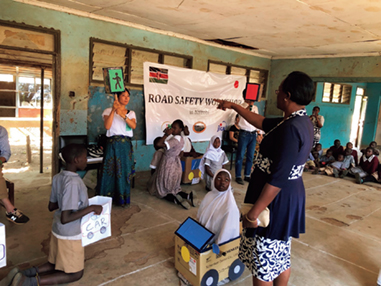
A teacher explaining a traffic signal at a traffic safety workshop for children (Photo: JICA)
Chronic traffic congestion in Nairobi, the capital of Kenya, is a major obstacle to the economic growth of the country. In order to improve the situation, Japan has been assisting projects* for expanding and upgrading of Ngong Road, the most congested one in Nairobi, and has been contributing to easing city traffic since 2012.
At the same time, as a result of the increase of the traffic speed due to the improvement of road conditions, the risk of traffic accidents, particularly for children going to schools near to Ngong Road, has been increasing. Pedestrian crossings, traffic signals and signs were installed under the Project for Dualling of Nairobi-Dagoretti Corner Road C60/C61, however, it is difficult to deliver proper treatment to traffic accident victims since emergency medical service is underdeveloped in Kenya. Approximately 13,000 people have died every year due to traffic accidents in the whole country. Appropriate measures should be taken promptly.
In order to improve this situation, a group of interested members of the Japan Overseas Cooperation Volunteers and the JICA experts in transport policy in Kenya, together with Kenyan staff from the National Transport and Safety Authority, planned and held a road safety workshop for the teachers of elementary schools located along the road in December 2018. In addition, in March 2019, in response to a request from the teachers of one of the elementary schools participating in the workshop, they also held a workshop for the children at the school.
One of the volunteers told that, as a result of the workshop run with the teachers, children who had answered “Time to cross!” when shown a yellow traffic light at the beginning came to understand the importance of looking both ways before crossing the road, something taken as a given in Japan. Going forward, Japan will continue to promote not only infrastructure development, but also assistance with the people in Kenya.
* “Project for Dualling of Nairobi-Dagoretti Corner Road C60/C61” (grant aid project) was implemented from 2012 to 2018. “The Project for Dualling of Nairobi-Dagoretti Corner Road C60/C61 (Phase 2)” scheduled from 2018 to 2020 is currently under implementation.
B. Cooperation with Japanese NGOs
Japanese NGOs implement high-quality development cooperation activities in various fields in developing countries and regions. Even in sites affected by conflict or natural disasters, such as earthquakes and typhoons, they have been providing prompt and effective emergency humanitarian assistance. NGOs are attuned to different local situations in developing countries and are capable of carefully tailoring responses to the needs of the local people. Accordingly, NGOs can provide assistance to even the hard-to-reach grassroots level through the support of the government and international organizations. MOFA regards Japanese NGOs that carry out activities, which represent the “Visibility of Development Cooperation,” as indispensable partners in development cooperation. It also promotes collaboration with them through the three pillars of funding assistance for Japanese NGOs (see below), support for the creation of an enabling environment for NGOs’ activities “Support for Establishing a Better Environment for NGOs Activities”, and “Dialogues with NGO”.
Based on the recommendations made by the Advisory Board for ODA, which held a total of four sessions in 2018, MOFA raised the general administrative expenses rate in April 2019 from the current 5% of local project expenses to a maximum of 15% within the Grant Assistance for Japanese NGO Projects (see below). This enables NGOs to use their own funds, which have been devoted to maintaining their own activities in implementing ODA projects, to instead strengthen their organization such as through activities in the field of public relations and fundraising, etc. It is expected that this will strengthen the financial foundation and organizational capacity of NGOs, and increase their recognition as a key player in implementing ODA projects both within Japan and abroad.
Furthermore, under the Development Cooperation Charter, MOFA and NGOs have jointly developed a plan outlining the direction of their collaboration over the next five years, and announced the plan in 2015. Subsequently, MOFA has been following up on this plan, releasing an annual progress report on the joint plan together with NGOs.
Funding Assistance for NGOs
The Government of Japan is cooperating in various ways to enable Japanese NGOs to smoothly and effectively implement development cooperation and emergency humanitarian assistance projects in developing countries and regions.
■Grant Assistance for Japanese NGO Projects
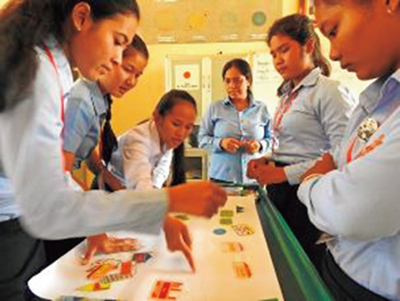
Students at a teacher education college in Cambodia taking a class on environmental education as part of the Grant Assistance for Japanese NGO Projects “Realization of Sustainable Life Environment through mainly the teaching practical environmental education in Teacher Education College (TEC)” (see the column for details) (Photo: Nature Center Risen)
MOFA provides financial support for the socio-economic development projects that Japanese NGOs implement in developing countries through the Grant Assistance for Japanese NGO Projects. There is a wide range of fields in which the projects are implemented, such as medical care and health, education and human resources development, vocational training, rural development, water resource development, and human resources development for landmine and unexploded ordnance (UXO) clearance. In FY2018, 59 Japanese NGOs utilized this framework to implement 106 projects in 31 countries and 1 region, amounting to approximately ¥5.04 billion.
■Japan Platform (JPF)
Japan Platform (JPF), an emergency humanitarian aid organization, was established in 2000 through a partnership among NGOs, the government, and the business community, and 43 NGOs are its members as of December 2019. JPF utilizes ODA funds provided by MOFA, as well as donations from companies and citizens to carry out emergency humanitarian assistance, such as the distribution of living supplies and livelihood recovery, when a major natural disaster occurs or a vast number of refugees flee from conflicts. In FY2018, JPF implemented 70 projects under 11 programs, including assistance for the humanitarian crises in Afghanistan, Yemen, Iraq, and Syria, humanitarian assistance in Gaza Strip in Palestine, assistance in South Sudan, humanitarian assistance for displaced persons from Myanmar, and assistance for people affected by flood damage in Mongolia and Laos (see the column).
■NGO Project Subsidies
MOFA provides subsidies to Japanese NGOs that conduct project formulation studies, post-project evaluations, and seminars and workshops in Japan and overseas for socio-economic development projects. The subsidies are provided at a maximum of ¥2 million up to half of the total project cost. In FY2018, eight organizations utilized these subsidies to implement activities such as project formulation studies, post-project evaluations, and seminars and workshops both in and outside of Japan.
■JICA Partnership Program (JPP)
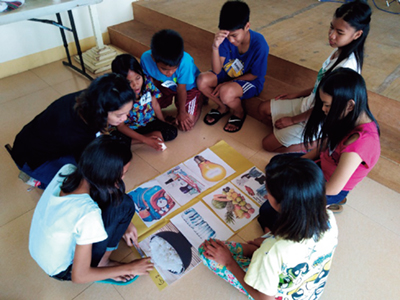
Children participating in a “Life Skills Improvement Activity” as part of the JICA Partnership Program (JPP), “Ensuring Children’s Potential for Development and Independence through Improved Residential Care Practices” (in the Philippines) (Photo: NPO ACTION)
JICA’s technical cooperation projects are occasionally outsourced to the private sector including NGOs, so as to make use of the expertise and experience of various organizations including NGOs, universities, and local governments. For example, JICA conducts the “JICA Partnership Program (JPP)” in which projects are implemented based on proposals by Japanese NGOs, universities, local governments, and public interest corporations, etc. with an interest in international cooperation. In FY2018, a total of 222 projects were implemented in 51 countries across the world. The Program offers three different kinds of schemes depending on the size and type of organizations: (i) Partner Type (scale of project: less than a total of ¥100 million, duration of project: less than 5 years), (ii) Support Type (scale: less than a total of ¥10 million, duration: less than 3 years), and (iii) Local Government Type (scale: less than a total of ¥30 million, duration: less than 3 years. Less than a total of ¥60 million for projects under the Special Category of Local Government Type).
Support for Establishing a Better Environment for NGOs Activities
Further measures to support Japanese NGO activities other than financial assistance include programs for establishing a better environment for NGO activities. The objective of these programs is to further strengthen the organizational arrangements and project implementation capabilities of Japanese NGOs, as well as develop their human resources. Specifically, MOFA carries out the following four programs.
■NGO Consultant Scheme
Under this scheme, MOFA commissions highly experienced NGOs in all of Japan (15 organizations in FY2018) that addressed inquiries and responded to requests for consultation from citizens and NGOs, regarding international cooperation activities, NGO organizational management methods, approaches for providing development education, etc.
■NGO Intern Program
This Program aims to open doors for young people seeking employment in Japanese international cooperation NGOs, and to train them to contribute to Japan’s ODA in the future. Through the development of these young people, MOFA seeks to expand and strengthen international cooperation in collaboration with Japanese NGOs. To this end, MOFA commissions international cooperation NGOs in Japan to accept and train interns, and disburse a certain amount of the training costs. In FY2018, a total of nine interns were accepted into NGOs through this program.
■NGO Study Program
Under the NGO Study Program MOFA covers the costs for the domestic and overseas training of mid-career personnel from Japanese international cooperation NGOs, aiming at strengthening their organizations through human resources development. The training is divided into two types: “Practical Training” (the participants improve their practical skills and gain working experience at NGOs that have an excellent track record of international development projects and relevant policy recommendations) and “Training Enrollment” (participants enroll in programs offered by domestic training institutions, aiming at improving their expertise). Trainees can establish training themes themselves, based on the issues that their organizations are facing. Upon returning to Japan, trainees are expected to utilize the fruits of their training for their organizations’ activities, and contribute to enhancing the capabilities of Japanese NGOs as a whole by sharing information with other Japanese NGOs. In FY2018, nine people received training through this program.
■NGO Study Group
MOFA supports Japanese NGOs in organizing study group meetings, aiming to improve the organizational capabilities and expertise of NGOs. Through this program, commissioned NGOs conduct studies, seminars, workshops (participatory lectures), and symposiums in cooperation with other NGOs, etc., and thereby report and recommend specific measures for improvement. In FY2018, NGO study groups were held on the following three themes: (i) “The Role of Japanese International Cooperation NGOs toward 2030,” (ii) “Fact-Finding Survey on Diversifying International Cooperation NGOs and the Social Sector,” and (iii) “SDGs 16.2 End Violence Against Children.” Activity reports and outcomes are available on the ODA website of MOFA.
■NGO Activities Support Project by JICA
Apart from the support provided by MOFA, JICA also conducts NGO activities support programs in various forms such as training for NGOs and NPOs, public interest corporations, educational institutions, and local governments that carry out international cooperation activities. It is designed for them to conduct and promote more effective and constructive projects. As part of JICA’s own initiatives or through proposals by NGOs, JICA organizes training concerning the implementation of projects in developing countries, necessary to carry out the JICA Partnership Program (JPP), as well as training tailored to the situation of each region and field to strengthen the functions of NGOs.
■NGO-JICA Japan Desk
In addition to supporting NGO’s on-site activities, JICA has also established “NGO-JICA Japan Desks” in 20 countries outside of Japan in order to strengthen projects jointly conducted by NGOs and JICA. The NGO-JICA Japan Desks provide support primarily in three areas: (i) Operations essential for the smooth implementation of JICA projects conducted in collaboration with Japanese NGOs, etc., (ii) Operations to assist on-site activities of Japanese NGOs, etc., and (iii) Operations necessary for enhancing cooperation between Japanese NGOs and JICA.
Dialogue with NGO
■ NGO-Ministry of Foreign Affairs Regular Consultation Meetings
In order to promote a stronger partnership and dialogue between NGOs and MOFA, the NGO-Ministry of Foreign Affairs Regular Consultation Meeting was launched in FY1996 for sharing information on ODA and regularly exchanging opinions on measures for improving partnerships with NGOs. In addition to the General Meeting held once a year, there are currently two subcommittees, the “ODA Policy Council” and the “Partnership Promotion Committee.” Both subcommittees are convened three times a year as a general rule. At the “ODA Policy Council,” opinions are exchanged on general ODA policies, while at the “Partnership Promotion Committee,” the agenda focuses on support for NGOs and partnership policies.
■NGO-Embassies ODA Consultation Meeting
Since 2002, the Japanese Government has been organizing “NGO-Embassies ODA Consultation Meetings” in developing countries where many Japanese NGOs operate, providing actors from embassies, JICA, and NGOs a platform to exchange their views on the efficient and effective implementation of ODA.
■NGO-JICA Consultation Meeting
Based on equal partnership with NGOs, JICA held the NGO-JICA Consultation Meeting three times in FY2018 to promote the realization of more effective international cooperation, as well as public understanding and participation in international cooperation.
Thailand
Community-based Comprehensive Elderly Care Project in Chonburi Province, Thailand
-Project in Saensuk Municipality as a Pilot Area-
JICA Partnership Program (Special Category of Local Government Type) (January 2016 - December 2018)
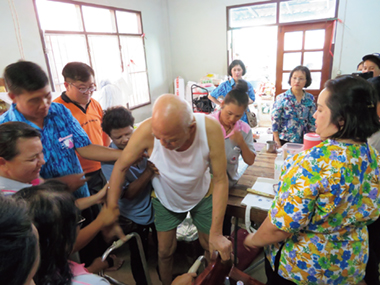
Health volunteers in Saensuk, who have learned Saku’s care techniques, helping a local elderly man rehabilitate (Photo: Ms. Ratana Chuklin, Project Assistant)
Aging population is becoming a serious problem not only in Japan and other developed countries, but also in developing countries that are growing economically. In such developing countries, aging is progressing more rapidly than in developed countries, and there is a need to develop human resources in caregiving and nursing for elderly people. Thailand is a typical example. Despite already becoming an aging society in 2014, and seeing the proportion of its population aged 65 or over rise to 10.7% by 2017, the country is still extremely deficient in caregiving personnel and inadequate in human resources development.
The Saku region, located in the eastern part of Nagano Prefecture, has been actively engaged in rural and regional medical care since around 1947, and has developed a comprehensive local system that provides care for the elderly. After students from Saku University began holding international nursing seminars at Burapha University in the municipality of Saensuk in Chonburi province in southeastern Thailand in 2014, the two universities started academic exchanges. This further developed into an exchange between the municipality of Saensuk and the city of Saku, and the project began in 2016. Saku City office partnered with hospitals and caregiving facilities in the city to receive and train nurses and health volunteers (the Thai equivalents of Japanese home care workers and caregivers) from Saensuk and dispatched short-term experts from Saku to Saensuk to conduct trainings.
Health volunteers started to conduct home care visits while respecting Thai traditions such as local temple assemblies and family-provided elderly care. Another goal of the project is for the nurses who were trained in Saku to become the key persons in Saensuk who will contribute to the establishment of a local nursing and caregiving system.
Through these activities, health volunteers in Saensuk have improved their ability to develop community activities as well as their care worker’s skills, and the frequency of home care visits has increased significantly from once per week before the project started to four times per week after its commencement, contributing to the improvement of the situation of elderly care. In addition, these activities have provided an opportunity for stakeholders in Saku to reconsider the home care system in the Saku region through experiencing the spirit of mutual help and mutual assistance between neighbors in Thailand. Also, the “technology transfer of the Saku city health care model to Thailand” has become widely known and is well received in Japan and abroad. It is expected that the Saensuk model will spread throughout Thailand in the future.
